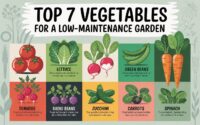How to Protect Your Vegetable Garden from Pests Naturally
Published: 2025-10-18
Creating a thriving vegetable garden is a rewarding experience. However, pests can quickly turn your hard work into frustration. Fortunately, there are natural ways to protect your vegetable garden from pests without using harmful chemicals. This guide will walk you through organic pest control methods that are safe, effective, and sustainable.
Why Natural Pest Control Matters
Natural pest control is essential for maintaining a healthy garden ecosystem. Unlike synthetic pesticides, organic methods do not harm beneficial insects or contaminate your soil. Moreover, they are safer for children, pets, and the environment.
Additionally, using natural pest control helps preserve biodiversity. Pollinators like bees and butterflies are not harmed. Soil microbes remain active. Your vegetables grow in a balanced environment. Therefore, your harvest is healthier and more nutritious.
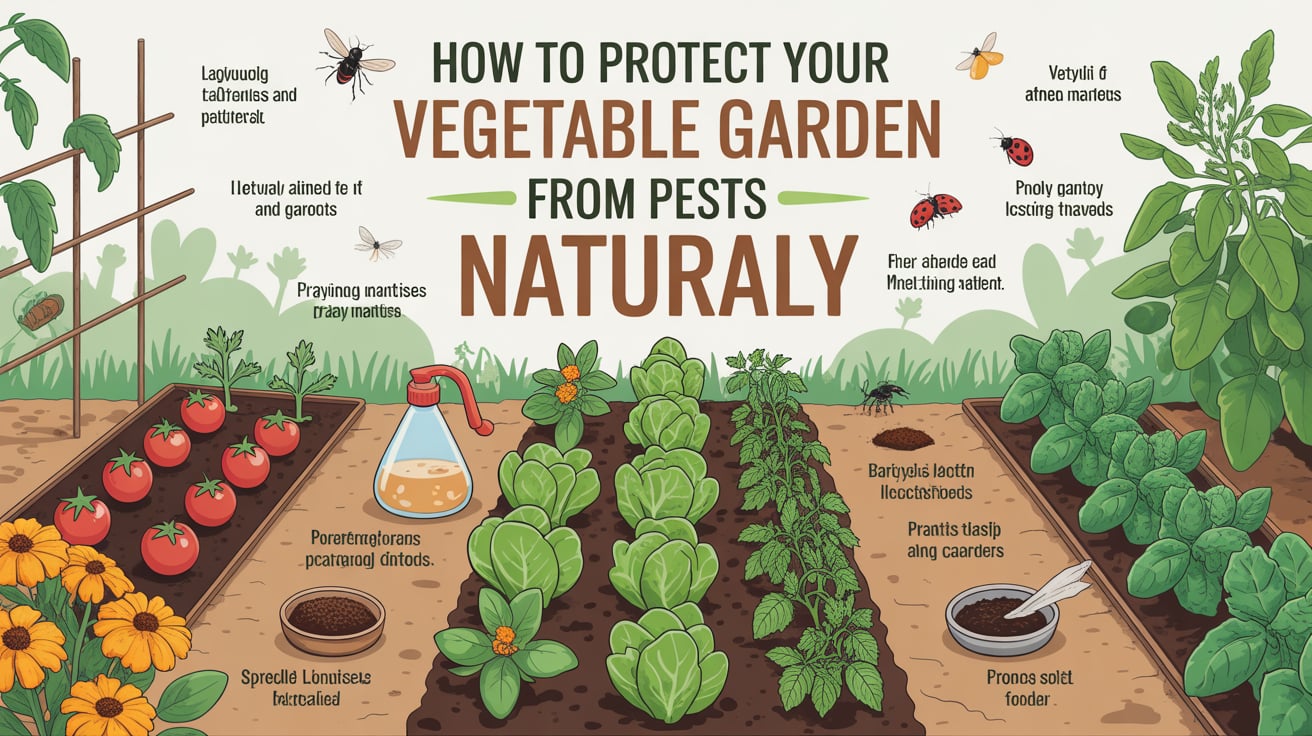
Identify Common Garden Pests
Before applying any solution, it is important to identify the pests in your garden. Different pests require different strategies. Here are some common vegetable garden pests:
- Aphids: Small, soft-bodied insects that suck sap from plants
- Cabbage worms: Green caterpillars that chew holes in leaves
- Cutworms: Larvae that cut young plants at the base
- Flea beetles: Tiny beetles that leave small holes in leaves
- Whiteflies: Tiny white insects that fly up when plants are disturbed
Once pests are identified, natural remedies can be applied more effectively.
Use Companion Planting for Pest Prevention
Companion planting is a time-tested method of natural pest control. Certain plants repel pests or attract beneficial insects. For example:
- Marigolds repel nematodes and aphids
- Basil deters mosquitoes and flies
- Nasturtiums attract aphids away from vegetables
- Garlic repels spider mites and whiteflies
- Chives deter carrot flies and aphids
By planting these companions near your vegetables, pest populations can be reduced naturally.
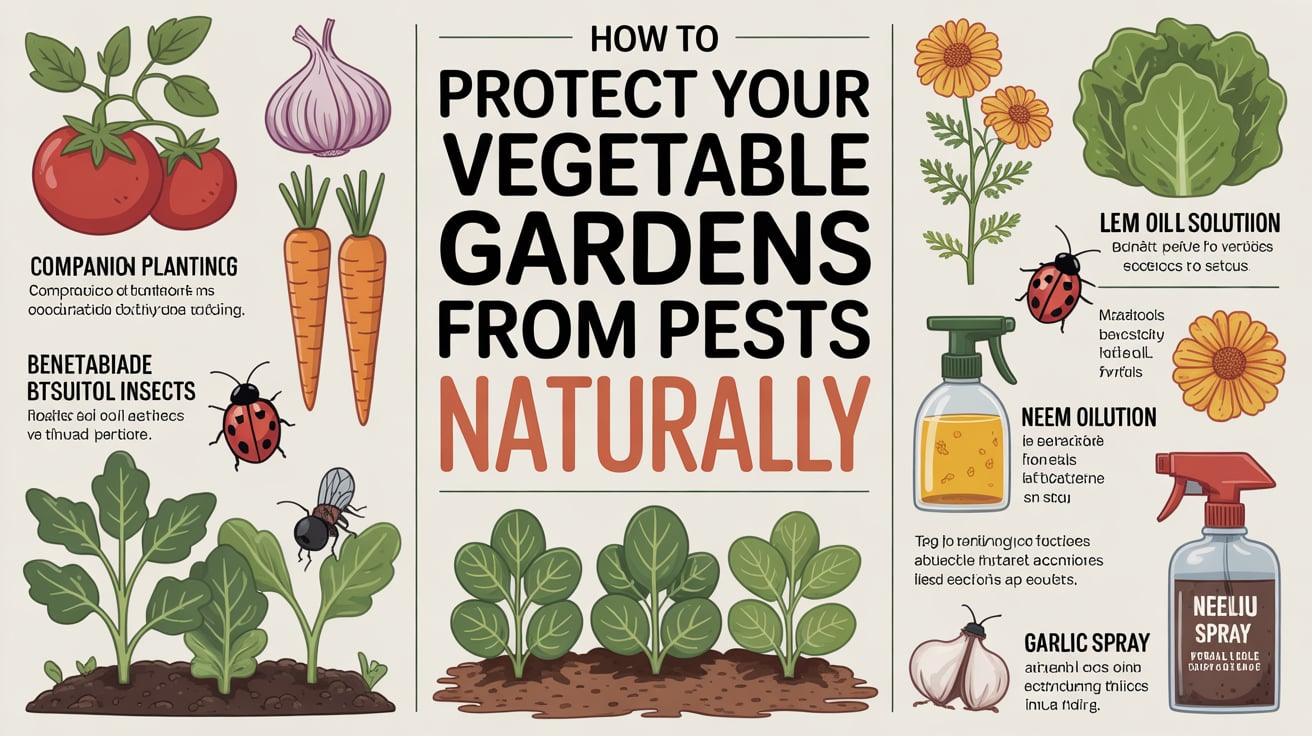
Attract Beneficial Insects
Not all insects are harmful. Some are natural predators of garden pests. Encouraging these beneficial insects can help maintain balance in your garden. Examples include:
- Ladybugs: Eat aphids and soft-bodied insects
- Lacewings: Feed on aphids, thrips, and whiteflies
- Parasitic wasps: Lay eggs inside caterpillars and aphids
- Ground beetles: Hunt slugs and cutworms
To attract these allies, plant flowers like dill, fennel, and yarrow. Avoid using chemical sprays that might kill them.
Homemade Insecticides for Vegetables
When pest populations grow, homemade insecticides can be used. These are safe for vegetables and the environment. Here are some effective recipes:
Neem oil is a natural pesticide that disrupts insect hormones. It is effective against aphids, whiteflies, and caterpillars.
How to make:
- Mix 2 teaspoons of neem oil with 1 teaspoon of mild soap in 1 liter of water
- Spray on affected plants every 7 days
Garlic and Chili Spray
This spicy spray repels many insects.
How to make:
- Blend 1 garlic bulb and 2 chili peppers with water
- Strain and mix with 1 liter of water and a few drops of soap
- Spray in the early morning or evening
Soap Spray
Soap breaks down insect membranes and kills them on contact.
How to make:
- Mix 1 tablespoon of liquid soap in 1 liter of water
- Spray directly on pests
These sprays should be tested on a small area first to avoid damaging plants.
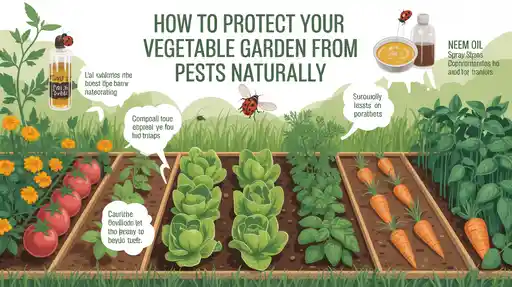
Use Physical Barriers
Physical barriers prevent pests from reaching your plants. They are especially useful for young seedlings. Common options include:
- Row covers: Lightweight fabric that allows sunlight and water but blocks insects
- Netting: Keeps birds and larger pests away
- Collars: Cardboard or plastic rings around stems to stop cutworms
- Mulch: Deters soil-borne pests and retains moisture
These methods are simple yet highly effective.
Crop rotation involves changing the location of crops each season. This disrupts pest life cycles and reduces soil-borne diseases. For example:
- Avoid planting tomatoes in the same spot every year
- Follow leafy greens with root vegetables
- Alternate legumes with brassicas
This strategy improves soil health and minimizes pe
Keep Your Garden Clean
A tidy garden is less attractive to pests. Regular maintenance includes:
- Removing dead leaves and plant debris
- Weeding to reduce hiding spots
- Cleaning tools to prevent disease spread
- Harvesting ripe vegetables promptly
These habits reduce pest breeding grounds and improve plant health.
Use Natural Predators
Introducing natural predators is another effective method. For example:
- Chickens eat beetles and larvae
- Ducks control slugs and snails
- Frogs consume flies and mosquitoes
Creating a habitat for these animals can enhance your garden’s defense system.
Apply Diatomaceous Earth
Diatomaceous earth is a powder made from fossilized algae. It damages insect exoskeletons and causes dehydration.
How to use:
- Sprinkle around plant bases and on leaves
- Reapply after rain
It is safe for humans and pets but deadly to insects.
Popular oils:
- Peppermint: Repels ants and aphids
- Rosemary: Deters cabbage moths
- Eucalyptus: Keeps flies and beetles away
Mix a few drops with water and spray on plants.
| Use Essential Oils |
|---|
Essential oils are potent and natural. They repel many pests without harming plants. Popular oils:
Mix a few drops with water and spray on |
Encourage Healthy Soil
Healthy soil supports strong plants. Strong plants resist pests better. To improve soil:
- Add compost regularly
- Use organic fertilizers
- Avoid overwatering
- Test pH and adjust as needed
Healthy roots lead to vigorous growth and natural pest resistance.
Monitor and Inspect Regularly
Early detection is key. Inspect plants at least twice a week. Look under leaves and along stems. Remove pests by hand when possible. Use sticky traps to monitor flying insects.
Rotate Pest Control Methods
Pests can adapt. Therefore, rotating methods prevents resistance. Alternate sprays, barriers, and predators. This keeps pests guessing and reduces their impact.
Avoid Overcrowding
Crowded plants are more prone to pests. They trap moisture and reduce airflow. Space plants according to guidelines. Prune regularly to maintain airflow.
| Use Raised Beds |
|---|
Raised beds improve drainage and reduce soil compaction. They also limit pest access. Use hardware cloth under beds to block burrowing pests like moles. |
Install Traps
Traps can reduce pest numbers. Examples include:
- Beer traps for slugs
- Yellow sticky traps for whiteflies
- Pheromone traps for moths
Place traps near affected plants and check them often.
Water Wisely
Overwatering attracts pests. Water early in the day. Use drip irrigation to keep leaves dry. Avoid splashing soil onto plants.
Grow Pest-Resistant Varieties
Some vegetable varieties resist pests naturally. Look for labels like “resistant to aphids” or “powdery mildew resistant.” These plants require less intervention.
Use Baking Soda Spray
Baking soda helps control fungal diseases and some pests.
How to make:
- Mix 1 tablespoon of baking soda with 1 liter of water and a few drops of soap
- Spray weekly
It is gentle on plants and effective against mildew and mites.
Install Bird Feeders
Birds eat many garden pests. Attract them with feeders and birdbaths. Avoid using netting that traps them.
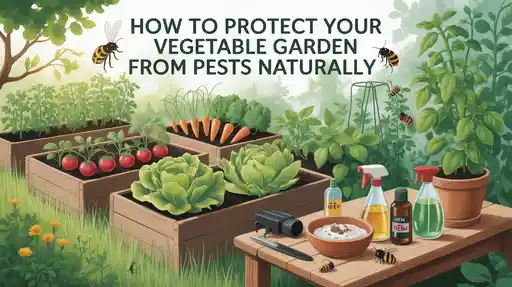
Use Coffee Grounds
Coffee grounds repel ants, slugs, and snails. Sprinkle around plants. They also enrich the soil with nitrogen.
Practice Intercropping
Intercropping mixes different plants together. This confuses pests and reduces outbreaks. For example:
- Plant onions with carrots
- Grow basil with tomatoes
- Mix lettuce with radishes
This method increases diversity and resilience.
Use Vinegar Spray
Vinegar is acidic and repels many insects.
How to make:
- Mix equal parts vinegar and water
- Add a few drops of soap
- Spray on affected areas
Avoid spraying on young or tender leaves.
Track what works and what doesn’t. Note pest outbreaks, weather, and treatments. Over time, patterns will emerge. This helps refine your strategy.
FAQs
Neem oil spray and companion planting are among the most effective natural methods.
Use homemade sprays, attract beneficial insects, and apply physical barriers.
Yes, when made with natural ingredients like garlic, neem oil, and soap.

- Be Respectful
- Stay Relevant
- Stay Positive
- True Feedback
- Encourage Discussion
- Avoid Spamming
- No Fake News
- Don't Copy-Paste
- No Personal Attacks



- Be Respectful
- Stay Relevant
- Stay Positive
- True Feedback
- Encourage Discussion
- Avoid Spamming
- No Fake News
- Don't Copy-Paste
- No Personal Attacks


